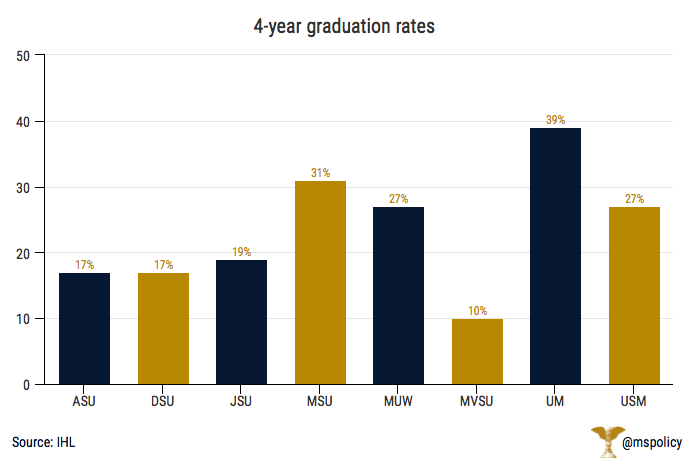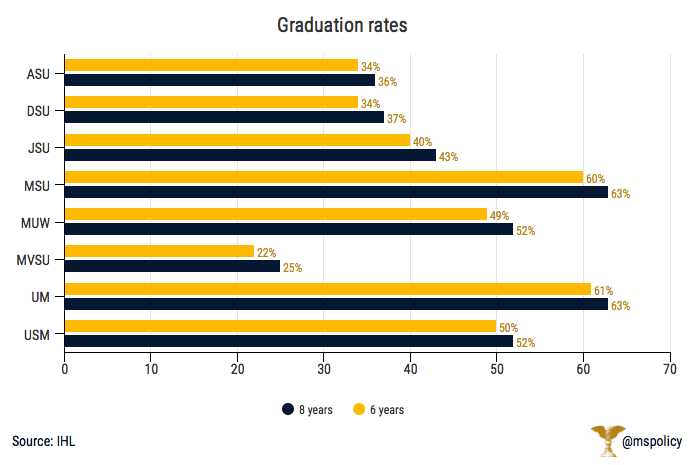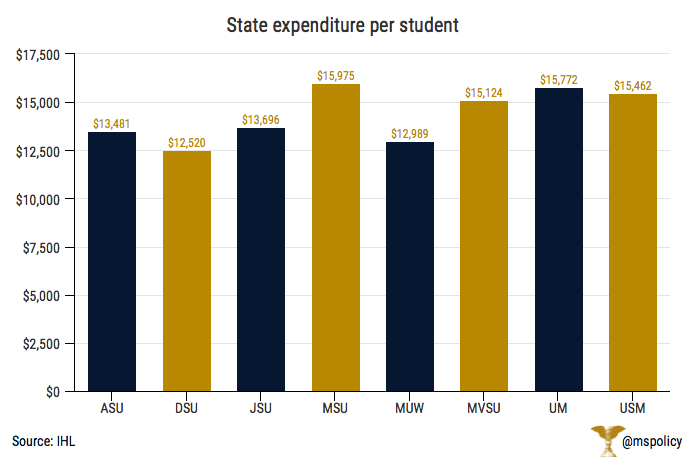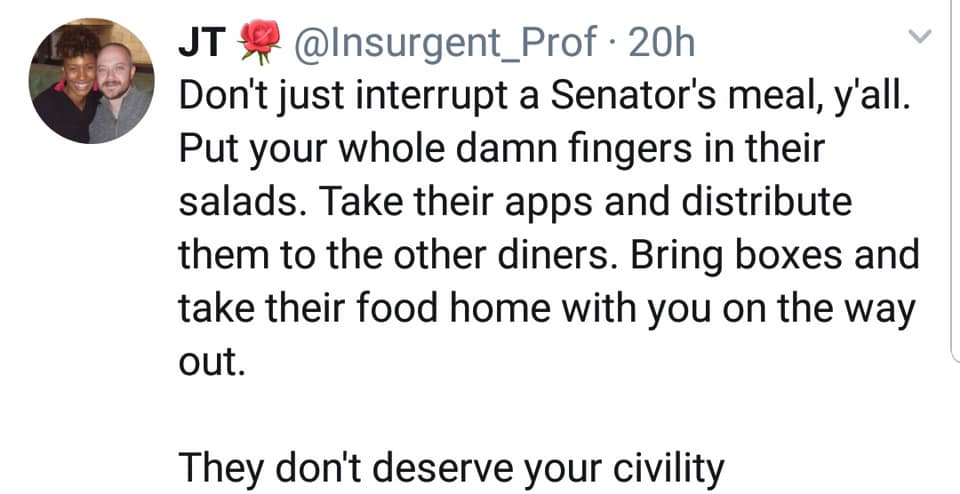Jeffrey Vitter, the chancellor at Ole Miss, will resign effective in January.
Vitter has been chancellor since January 2016 and he still has two years remaining on his contract. It is likely that he stays on in some role at the university. But this is the second consecutive chancellor to have an abrupt exit from Oxford. In 2015, the Institutions for Higher Learning, which selects the leaders of the eight public universities in the state, chose not to extend the contract of then-Chancellor Dan Jones.
Jones was at Ole Miss for only four years. Prior to Jones, Robert Khayat served as chancellor for 14 years as the university experienced tremendous growth.
There have been numerous issues at Ole Miss recently ranging from football probation, and the marked decline in attendance and interest among fans and alumni, to declining enrollment to how the Ed Meek controversy, among other controversies, was handled.
IHL will be tasked with selecting the next leader for Ole Miss. All indications are that this will be a relatively long process with multiple factions supporting different people.
Only 29 percent of students who entered a public university in 2009 in Mississippi graduated within four years.
That is according to the most recent data from the Education Achievement Council Report Card, which was recently made available by the Institutes for Higher Learning. The national average, according to the United States Department of Education, is 40 percent for all four-year institutions and 35 percent for public institutions.
Fifty-two percent in Mississippi graduate within six years and 54 percent graduate within eight years. Nationally, 59 percent graduate (including data from both all institutions and public institutions only) within six years.

Ole Miss had the highest four-year graduation rate at 39 percent, though that is still less than two-in-five students. Thirty-one percent graduate within four years at Mississippi State. Mississippi Valley State had the lowest four-year graduation rate at just 10 percent.

Ole Miss (61 percent), Mississippi State (60 percent) and Southern Miss (50 percent) were the only three institutions to have more than half of the freshmen graduate within six years. Mississippi University for Women just missed that cut at 49 percent. Valley, once again, had the lowest six-year graduation rate at just 25 percent.
But Valley also had 47 percent of their new undergraduate students enrolled in one of more intermediate courses, with about a quarter enrolled in both math and reading courses during their first year.
In contrast, just seven percent of new undergraduate students at Mississippi State and eight percent at Ole Miss required such courses. The system average was 16 percent.

Higher education spending accounts for about 13 percent of the state budget. Broken down, the total state expenditure per full-time equivalent student topped $15,000 at half of the universities. The highest was Mississippi State at $15,975 followed by Ole Miss ($15,772), Southern Miss ($15,462), and Valley ($15,124). Delta State had the lowest mark at $12,520.
The report cards for each university can be found here.
The EPA and the Department of Transportation have been working together for the past year to create a new set of standards for the automotive industry. The goal is to use a lighter regulatory hand and a more consumer-friendly approach to address the burdensome and wildly expensive standards mandated during the Obama administration.
The 2012 CAFÉ (Corporate Average Fuel Economy) standard went well beyond a rational approach in the name of the environment.
Americans should have the freedom to decide what kind of car they drive, not bureaucrats in Washington or California. Choosing that car and producing cars that meet those needs does not mean that Americans, or the companies that produce their cars, are not concerned about the environment. We can do both. We can balance social, environmental, and economic impacts.
The proposed new standards, called SAFE (Safe Affordable Fuel Efficient Autos) are a smart and reasonable approach to keeping cars affordable while also ensuring increased fuel efficiency and improved emissions. The CAFÉ standard went beyond boundaries allowed by the Clean Air Act and basically doubled the fuel efficiency standards for American vehicles - mandating new cars have an average fuel efficiency of 54.5 MPG by 2025.
For many citizens, car ownership isn’t a luxury; it’s a lifeline. Creating reasonable and balanced automotive standards will have a positive impact on millions of Americans and thousands of Mississippians who rely on their cars every single day. It’s time we let consumers decide what kind of car to drive, not unelected bureaucrats in Sacramento.
At the Mississippi Center for Public Policy, we support the SAFE standards for four main reasons:
- We believe automakers should design vehicles to meet the choices of consumers, not to meet the preferences of bureaucrats.
- We believe no state should get to dictate the kinds of cars another state’s citizens can or should drive. To California, we say, “You sweep your porch and we’ll sweep ours.”
- We believe the CAFÉ mandates were based on a world of energy scarcity, not the world of energy abundance in which we live today.
- We believe if left unchanged, the current standards would significantly increase the average cost of a vehicle and provide an unnecessary burden on many Mississippians – even pricing some consumers entirely out of the new car market. This would increase safety risks for some and could also prove to be a drag on the automotive industry – an important part of the Mississippi economy.
For additional reading on the proposed reforms, check out this article: https://thehill.com/opinion/energy-environment/409512-unreasonable-demands-stifle-real-environmental-progress
Over the past 20 years, the price of a college education has increased nearly 200 percent.
These numbers, adjusted for inflation, trail only the cost of hospital services when it comes to changes in the prices of consumer goods and services. During the same period, inflation stands at 55 percent.
What about other items? The price of housing has increased at about the rate of inflation. But consumer goods such as cars, household furnishings, clothing, cellphone service, software, toys, and TVs are all cheaper today than they were in 1997. In some instances, the prices have decreased significantly.
So why have the prices of some items decreased? And why have some, college education in particular, become more expensive? As with most items that have become more expensive, we can largely thank the government.
It’s the law of unintended consequences that we often see with federal legislation. A prime example is the “Great Society” of the 1960s. As we grew the welfare state as a nation, out-of-wedlock birth rates increased from about 5 percent fifty-years-ago to over 40 percent today. In Mississippi, it’s 53 percent. As a result, we have generations of children who grew up without Dad, leading to numerous negative societal effects.
The Americans with Disabilities Act, or ADA, is another example of unintended consequences. Designed to lower barriers to employment for disabled persons, research shows that the law has actually harmed employment opportunities for those who are disabled. Prior to the law, 60 out of every 100 disabled men were able to find jobs. Thanks to the bad incentives created by the law, the number fell to 50 per 100 disabled men after the ADA went into effect.
In an effort to make college more affordable, government involvement has only made college more expensive. Because of readily available financial aid, there are no market mechanisms to control for costs. While those in the private sector have incentives to constantly innovate and maintain competitive costs, there is no such need in higher education. After all, when tuition goes up at Ole Miss, it also goes up at Mississippi State. The schools see no benefit to lower costs. If a school wants to raise tuition, the money to attend will be there - courtesy of Washington, D.C.
Unfortunately, that money isn’t just going toward educational purposes. The ballooning costs of a four-year education are funding new administrators and non-teaching sprawl on campus. Indeed, universities now employ more administrators than faculty members. And as part of an education arms race on non-education services, we constantly see new and improved cafeterias, student unions, recreation centers, climbing walls, and other things today’s students apparently need in today’s university experience.
As prices climb, students, and their families, don’t really notice it. At least, not at the time. Because most students are just taking out loans and money is going directly from the federal government to the office at a university that handles student account payments, the student never feels the pain of writing a large check.
And as the federal money flowed, we watched a dramatic change. The missions of colleges and universities shifted from teaching and preparing students to use critical thinking and particular skills to start a successful career to preparing students for a future in political correctness, being constantly offended, and progressive indoctrination.
We’ve seen campuses shift from a place where rigorous intellectual debate, along with civility and decorum, is the norm to one in which conservative speakers are routinely shouted down and even shut down, simply because some students don’t like their message or feel offended by speech with which they disagree. Sadly, administrators are often complicit in this censoring, if not supportive of the protesting actions.
Most recently, a sociology professor at Ole Miss, James Thomas, made national news when he encouraged protestors to “put your whole fingers in their salads” and to “bring boxes and take their food home.” Because, as Thomas put it, “They (Republicans) don’t deserve your civility.” This came on the heels of liberal activists confronting and harassing Republican Senators while they were dining out.
If we want to make college affordable and return higher education to the respected and noble status it once held, we must end federal subsidies to colleges and universities. For more than a century, the American university system was considered the best in the world for providing a classical liberal undergraduate education. Our federal government has jeopardized that.
For the sake of our future generations, we’ve got to reclaim our public colleges.
This column appeared in the Madison County Journal on September 25, 2018.
A professor at Ole Miss is encouraging Americans to publicly confront, disrupt, and harass Republicans in public.
James Thomas, an assistant professor of sociology at Ole Miss, tweeted on October 6, “Don't just interrupt a Senator's meal, y'all. Put your whole fingers in their salads. Take their apps and distribute them to the other diners. Bring boxes and take their food home with you on the way out. They don’t deserve your civility.”

This came after protestors interrupted Sen. Ted Cruz and his family during a meal in Washington, D.C. Such interactions have become all too common with Republican elected officials and liberal protestors.
Most recently, two Republicans in Minnesota were attacked in separate incidents. Minnesota State Rep. Sarah Anderson was punched in the arm by a man while Shane Mekeland, a candidate for the state legislature in Minnesota, suffered a concussion after being attacked in a restaurant.
Ole Miss Chancellor Jeffrey Vitter posted a response on Facebook, saying, “A recent social media post by a UM faculty member did not reflect the values articulated by the university, such as respect for the dignity of each individual and civility and fairness. While I passionately support free speech, I condemn statements that encourage acts of aggression. I urge all members of the Ole Miss community to demonstrate civility and respect for others and to honor the ideal of diversity of thought that is a foundational element of the academy.”
Ironically, for someone who is calling for public harassment of people he disagrees with, Thomas’ tweets are protected and only confirmed followers have access to them. And when Campus Reform attempted to reach out to Thomas, he hung up on them.
If you are wondering what it takes to become a college professor at a major, liberal arts university today, you might enjoy watching this video on the subject:
[embedyt] https://www.youtube.com/watch?v=aU7_aDc2JXE[/embedyt]
This morning, a coalition of 30 free market policy groups, including the Mississippi Center for Public Policy, sent a letter to House Ways and Means Committee Chairman Kevin Brady objecting to any expansion of the federal electric vehicle tax credit.
The letter encourages Chairman Brady to reject attempts by the EV lobby and their allies in Congress to slip a tax-credit cap increase into upcoming spending packages. Congress has a responsibility to spare American taxpayers increased economic harm from a subsidy that benefits only those who can afford expensive electric vehicles.
American Energy Alliance President Thomas J. Pyle made the following statement:
“The electric vehicle tax credit subsidizes expensive vehicles that only a fraction of wealthy Americans want and that do not necessarily pollute less than modern internal combustion engines.
“Why should a typical middle class American family — with a median annual income of $44,000 — subsidize the lifestyles of the rich and famous? Political leaders should recognize that Americans can make their own decisions about how to spend their money and what cars they want to drive. We shouldn’t give handouts to wealthy individuals to help defray the cost of their luxury vehicles.”
The full letter can be found here.
This press release is from the American Energy Alliance.
Preliminary data shows that overall enrollment in Mississippi’s eight public universities and 15 community and junior colleges is down over the previous year.
Enrollment for the fall of 2018 stands at 80,592, compared to 81,378 last year.
Among Mississippi’s eight public universities, enrollment is up at Alcorn State, Mississippi State, Mississippi Valley State, and Southern Mississippi. Enrollment is down at the other four universities: Delta State, Jackson State, Mississippi University for Women, and Ole Miss.
Southern Miss enjoyed the largest growth, from 14,478 students to 14,743, an increase of 1.8 percent. Their freshman class grew from 1,903 students last year to 2,115 this year. Mississippi State grew by 1.5 percent, from 21,883 students to 22,201. State’s freshman class grew from 3,438 students to 3,599.
Ole Miss, including enrollment at the University of Mississippi Medical Center in Jackson, has the largest enrollment in the state at 23,258. That is down 2.2 percent from last year when the system enrolled 23,780 students. This is the second consecutive year of a decline. Last year’s enrollment was down 1.9 percent. The freshman class at Ole Miss is down 6.5 percent, from 3,697 students to 3,455.
The biggest drop, however, was at Jackson State. Enrollment is down to 7,709 from 8,558 last year. This represents at 9.9 percent decrease.
Total student enrollment, Fall 2017 compared to Fall 2018
| Institution | 2017 | 2018 | Number change | % change |
| Alcorn State | 3,716 | 3,753 | 37 | 1% |
| Delta State | 3,789 | 3,784 | -5 | -0.1% |
| Jackson State | 8,558 | 7,709 | -849 | -9.9% |
| MSU | 21,883 | 22,201 | 318 | 1.5% |
| MUW | 2,789 | 2,738 | -51 | -1.8% |
| MVSU | 2,385 | 2,406 | 21 | 0.9% |
| Ole Miss | 23,780 | 23,258 | -522 | -2.2% |
| Southern | 14,478 | 14,743 | 265 | 1.8% |
| Totals | 81,378 | 80,592 | -786 | -1% |
Enrollment among Mississippi’s 15 junior and community colleges fell to 72,255, a decline of 0.8 percent from the previous year. Pearl River (2.6 percent), Southwest Mississippi (2.9 percent), Northeast Mississippi (2.9 percent), and Mississippi Delta (3.2 percent) were the largest gainers.
Coahoma (-5.2 percent), Northwest Mississippi (-5.8 percent), and Meridian (-6.3 percent) had the biggest drop percentage wise. Hinds, whose enrollment was flat, remains the largest school in the community college system at 11,833 students.
We don’t want government telling us what to put in our mouths any more than we want them to tell us what can come out of our mouths. And the federal government has no legal authority to prevent state governments from changing their laws to remove state-level penalties for medical marijuana use. As a conservative state with a love for individual liberty and for federalism, this should be an easy decision, especially if we take the time to review the facts. In my view, the evidence is overwhelming.
Polling demonstrates that citizens are ahead of politicians and legislators across the county on this issue, with anywhere from as low as 65 percent to as high as 94 percent of Americans supporting the legalization of medical marijuana. And it spans all ages and party affiliations. A vast majority of Americans recognize the legitimate medical benefits of marijuana, as well as a large number of medical organizations. It is less harmful and poses fewer negative side effects than most prescription drugs – especially opiate-based painkillers – and patients often find it to be a more effective treatment.
Licensed medical doctors, already heavily regulated by the state, should be allowed to recommend solutions to deal with debilitating medical conditions, no matter the derivative of such solutions. If marijuana can provide relief to those suffering from terrible illnesses like cancer and HIV/AIDS, it is unconscionable to criminalize patients for using it. People who would benefit from medical marijuana should have right to use it legally. Legal prohibitions on commonly accepted behavior has never produced positive results. It’s bad public policy.
Medical marijuana is not the same as recreational marijuana and to try to conflate the two is an insult to the citizens of Mississippi and comes at the expense of patients who should be free to choose a legal option to opiate-based painkillers, with the guidance of their doctor. Rather than trying to turn this issue into a “law and order” one and attempting to convince us that patients suffering from debilitating illnesses and the doctors caring for them are criminals, our politicians should focus on removing this unnecessary barrier. The federal government put the barrier in place and 31 other states have rightly removed it. There is no legitimate reason for Mississippi not to do the same.
This is not a “crackpot” or “fringe” issue. The American Medical Association, The Institute of Medicine, and the American College of Physicians have all acknowledged the potential benefits of medical marijuana and the New England Journal of Medicine reported 76 percent of surveyed physicians would recommend it to a patient. Other legitimate health organizations supporting it include; American Academy of Family Physicians, American Nurses Association, American Public Health Association, American Academy of HIV Medicine, and the Epilepsy Foundation.
Government is already regulating the healthcare industry at an unprecedented level. The federal government has grown into an unwieldy and unresponsive beast – increasing its paternalism over us all. Is all of this really required? Is it even legitimate? Mississippi can join the other states who value federalism and respect the rights of patients and licensed doctors to decide what is best.
For liberty-minded conservatives, this should be an easy decision.
This column appeared in the Clarion Ledger on August 6, 2018.
The Trump administration has expanded options for families struggling to find affordable health coverage.
The departments of Health and Human Services, Labor and the Treasury issued a new rule allowing individuals or families to utilize short-term, limited duration plans of up to 12 months, with potential for extensions up to 36 months. The Obama administration restricted these plans to three months without the option for renewal in 2016.
Short-term, limited-duration insurance is not required to comply with federal market requirements. It is largely used for those who are transitioning between different coverage options, such as those who would otherwise have a lapse in coverage when starting or transitioning to a new job, but can also be used by families without access to subsidized Obamacare plans because they make a little too much to qualify for a subsidy.
But they can’t afford the cost of health insurance.
These plans will be significantly more affordable. In the fourth quarter of 2016, the average monthly premium for an individual with a short-term plan was $124, compared to $393 for an unsubsidized plan in the exchange.
A recent report found that the number of people enrolling in the individual markets without subsidies declined by 20 percent, while premiums rose by 21 percent.
The Affordable Care Act is not working for too many Americans and it is becoming too expensive. This is a step to finding alternative healthcare coverage options for middle class citizens who are caught in the gap between not having employer-provided benefits and not qualifying for ACA subsidies.
Any steps towards a more market-based approach where we start to introduce competition, choice, and price rationale to the healthcare system is welcomed.
